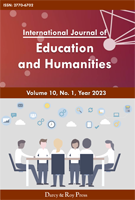Emotion, Network, and Institution: The Triple Logic of the "Cultural Identity-Investment Willingness" Conversion Mechanism for the New Generation of Teochew Diaspora
DOI:
https://doi.org/10.54097/fctzcr77Keywords:
New Generation of Overseas Chinese, Teochew Diaspora, Cultural Identity, Investment Willingness, Conversion Mechanism, Triple LogicAbstract
The new generation of Teochew diaspora is emerging as a critical force linking their homeland with global resources. How their "cultural identity" is effectively converted into "investment willingness" is a core issue for the sustainable development of Qiaoxiang (hometowns of overseas Chinese). Traditional research has either been confined to the singular perspective of "emotional drive" or fallen into the trap of "rational choice" economic reductionism, neglecting the complexity and dynamism of the conversion process. This article, based on the "embeddedness" theory from economic sociology, constructs a "Emotion-Network-Institution" triple-logic analytical framework to parse this conversion mechanism. The study posits that: Emotional Logic serves as the foundational impetus for the conversion, centered on "nostalgic memory" and "identity," providing the original psychological momentum and value orientation. Network Logic acts as the conversion accelerator, utilizing social capital such as "Teochew chambers of commerce" and "fellow townsmen associations" as vectors. Through information screening and credit endorsement, it accelerates the filtration of abstract emotional intentions into concrete business opportunities. Institutional Logic functions as the security guarantee, with the business environment, represented by "policy transparency" and "property rights protection," providing the final safety threshold and legitimacy guarantee for investment decisions, determining the conversion's sustainability and scale. These three logics are nested and sequential, collectively forming a complete closed loop for the conversion of the new generation's cultural identity into economic behavior. This study aims to transcend the "culture/economy" dichotomy, offering a new theoretical perspective for Qiaoxiang to implement precise policies and optimize work related to overseas Chinese affairs.
Downloads
References
[1] Zhou, Y. E., & Guo, J. (2021). Research on the New Generation of Overseas Chinese: Theory, Status Quo, and Trends. Overseas Chinese History Studies, (1), 1-13. [in Chinese]
[2] Zhuang, G. T. (2005). On "Nostalgia Economy": A Cultural Interpretation of the Transnational Economic Phenomenon of Overseas Chinese. Overseas Chinese History Studies, (3), 1-10. [in Chinese]
[3] Granovetter, M. (2007). Economic Action and Social Structure: The Problem of Embeddedness. Sociological Research, (3), 1-22. [Chinese translation of the 1985 AJS article]
[4] Guo, J., & Zhou, Y. E. (2022). Construction and Practice of Identity of the New Generation of Overseas Chinese in the Context of Globalization. Southeast Asian Studies, (4), 112-132. [in Chinese]
[5] Portes, A. (2005). Social Capital: Its Origins and Applications. (Yu, Z. L., Trans.). Beijing: Social Sciences Academic Press. [Chinese translation]
[6] Chen, Y. P. (2020). Research on the Transnational Network and Business Model Evolution of the Chaoshan Merchant Group. Overseas Chinese History Studies, (2), 35-46. [in Chinese]
[7] North, D. C. (2014). Institutions, Institutional Change and Economic Performance. (Hang, X., Trans.). Shanghai: Gezhi Publishing House. [Chinese translation]
[8] Zhang, Z. J. (2023). Business Environment, Institutional Trust, and Overseas Chinese Investment Decisions. World Economics and Politics, (5), 80-103. [in Chinese]
Downloads
Published
Issue
Section
License
Copyright (c) 2025 International Journal of Education and Humanities

This work is licensed under a Creative Commons Attribution 4.0 International License.

















